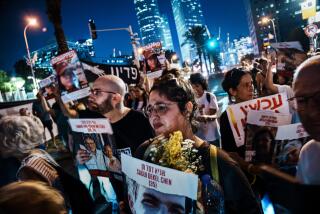Army hopeful for captives
- Share via
BAGHDAD — Two of the three U.S. soldiers missing since a May 12 ambush south of Baghdad are believed to have been alive as recently as Friday morning, but the third may be dead, the military said Saturday.
The men have been the focus of a huge dragnet by U.S. troops, who have detained more than 700 people for questioning in and around Yousifiya, a market town 10 miles south of the capital.
Information obtained from the detainees and other sources has provided a clearer picture of the ambush, but the military still does not know the men’s status, the top U.S. commander in Iraq said in an interview with Army Times published Saturday and confirmed by a spokesman, Col. Steven Boylan.
The military did not make clear what led it to believe that the two soldiers were still alive as of Friday.
Army Gen. David H. Petraeus, the top U.S. commander in Iraq, told the newspaper that the military had identified the person chiefly responsible for the abduction of the three men and the killing of four other soldiers and an interpreter.
“We know who that guy is,” he said. “He’s sort of an affiliate of Al Qaeda. He’s the big player down in that area. We’ve tangled with him before.”
The missing are Pfc. Joseph J. Anzack Jr., 20, of Torrance; Spc. Alex R. Jimenez, 25, of Lawrence, Mass.; and Pvt. Byron W. Fouty, 19, of Waterford, Mich. It is not known who among them may be dead or alive, Boylan said.
As the hunt for the men continued Saturday, British Prime Minister Tony Blair made a lightning visit to the capital, the military reported the deaths of five troops and the bodies of 55 Iraqis were found across the country.
In the Army Times interview, Petraeus said, “We just tragically haven’t found the individuals. But on the other hand, they haven’t been able to smuggle out, at least to my knowledge, the traditional video.”
Boylan said no one has contacted authorities to provide any proof that the missing soldiers are alive or to try to negotiate terms for their release. He would not reveal the source of information for Petraeus’ remarks.
In the latest deadly attack against U.S. forces, a soldier was killed and three were wounded Saturday by a roadside bomb south of Baghdad.
The military reported the deaths Friday of four other troops. One was killed by small-arms fire south of Baghdad, one in combat in Al Anbar province, and two by a roadside bomb and small-arms fire in northwest Baghdad. The deaths raise the number of U.S. forces killed in Iraq to 3,415, according to icasualties.org.
Northeast of Baghdad, gunmen wearing Iraqi army uniforms killed 15 Kurdish villagers Saturday. Iraqi army Brig. Gen. Nazim Sherif said the gunmen forced the victims from their homes in Hamid Shifi, a village in lawless Diyala province, then shot the men, the Associated Press reported.
Sherif said there had been no threats against the villagers and the motive was unclear.
In various cities, dozens of bodies were found Saturday with bullet wounds and signs of torture. Twenty-one were found in Diyala province, 20 in Baghdad, seven in Khalis and seven in Muradiya.
A mortar shell landed in the capital’s Green Zone as Blair, who leaves office next month, paid a visit. The attack slightly injured an Iraqi.
During a news conference, Blair said progress was being obscured by disproportionate attention paid to the car bombs, mortar fire and attacks.
“Look, there are mortar attacks and terrorist attacks happening every day. That’s the reality,” Blair said. “The question is: What are we going to do in the face of these attacks?”
Blair repeated that he saw “real signs of change and progress” in Iraq but declined to be specific, deferring to Iraqi Prime Minister Nouri Maliki when he was challenged by reporters.
The Iraqi leader cited Al Anbar province, where Sunni sheiks have lent their support to the U.S.-Iraqi security plan for the region, and Kurdistan in the north, where he said the number of car bombs has dropped “from 10 to 14 before, and to two to three a day now.”
Maliki acknowledged that the violence remains a problem and he blamed extremists “being financed from abroad and those who want this government to fail.”
Behind closed doors, Maliki told Blair that he was concerned about support being offered to militants from sources in Saudi Arabia and other Persian Gulf states, according to a source privy to the talks.
Maliki also brought up concern that other political powers might be working toward a coup in Iraq, but Blair reassured him that neither Britain nor the U.S. would support such a move, the source said.
Britain has almost completed the pullout of about 1,600 troops, leaving a force of 5,500 based mainly on the fringes of the southern city of Basra, which Blair also visited Saturday.
He vowed that British involvement in Iraq would continue after he leaves office.
*
Times staff writers Said Rifai and Ned Parker and special correspondents in Baghdad contributed to this report.
More to Read
Sign up for Essential California
The most important California stories and recommendations in your inbox every morning.
You may occasionally receive promotional content from the Los Angeles Times.














